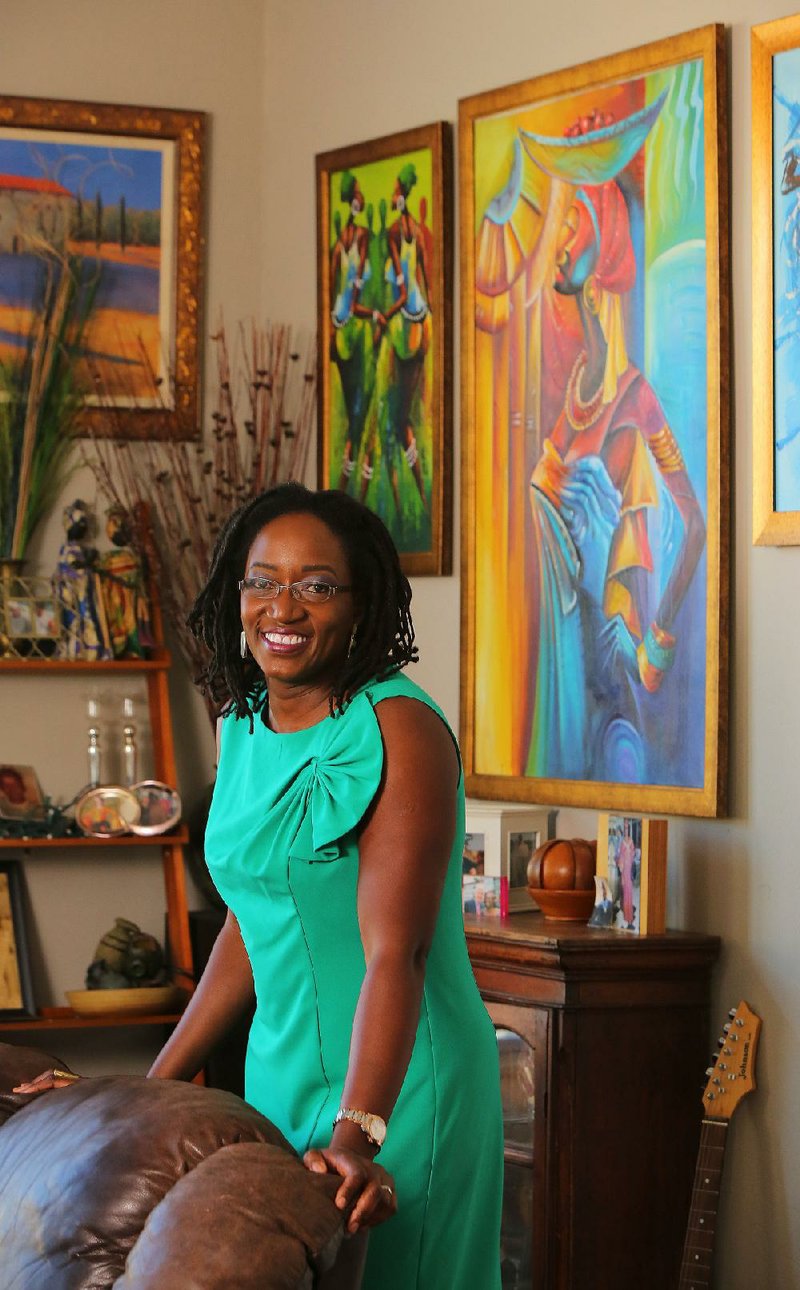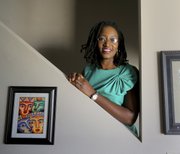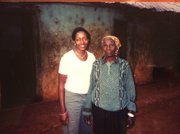Elizabeth Elango Bintliff is charismatic. She’s sharp and happy and traveled, so after a bit, when she makes a bombastic prediction, it’s all nods around the table. “Fifty years from now, it won’t matter … what country you’re from to be the president of that country,” she says. “Nationality is going to be an obscure concept. People will be hiring presidents, the best president for that country.”
That Iron Age reality turned 21st-century metaphor, the world is flat? It feels like that for this 39-yearold former head of Africa programs for Heifer International. Airports across the Atlantic are as familiar as Little Rock intersections. Time zones come and go like the weather. “The people I know, for the most part … are hopping from country to country, and live in that space of the world is” — she makes a picture frame — “this big.”
Date and place of birth: Jan. 8, 1977, in Victoria (now Limbe), Cameroon
Family: husband, Jason, and daughters Indira, 7, and Avira, 5
Three people I’d have at my fantasy dinner party: Terry Gross, Melinda Gates and Lisa Vanderpump
I collect elephants, and magazine covers of Michelle Obama
My fitness routine is nonexistent. In my mind I exercise a lot. When I pack for a trip I pack exercise clothes. They don’t come out.
My favorite movie: The Sound of Music … I thought I wanted to have seven children. So much complexity put to song by Rodgers and Hammerstein as only they can, and a fun-loving nun.
On my bucket list, there’s taking my daughters to all the places they want to go in the world. My 7-year-old wants to go to China for her 10th birthday, and the 5-year-old wants to go to the pyramids in Egypt when we’re in Africa. I’m amazed that they know [these places], and I want to make that happen for them.
I drive a 2011 Toyota RAV 4, black, that I sold last week in anticipation of our move, but I plan to buy the exact same car in Ghana.
When I’m in the shower, I sing praise and worship songs. Right now “Oceans” is playing on heavy rotation. The chorus is “Spirit lead me where my trust is without borders. Let me walk upon the waters wherever you may call me. Take me deeper than my feet could ever wander and my faith will be made stronger in the presence of my savior.” It is the soundtrack of my faith walk to Ghana.
Worst habit: Fidgeting with my fingers.
One thing every man should know about women is, if we cry, it is not a sign of weakness. It is simply an expression of emotion.
A phrase that sums me up: Very caring person
The fourth child of Lovett and Susan Elango, a pair of U.S.-educated Cameroonians, Elizabeth grew up in Douala and went to Catholic and Baptist boarding schools. She obtained degrees from Kennesaw (Ga.) State University and Yale before moving to Little Rock in 2002 for a job at Heifer headquarters. She married a Hendrix College-educated artist and had two daughters. Recently, she was named CEO of Africa projects for the nonprofit Junior Achievement, and next month the family moves to Ghana.
Permanently?
More permanent than temporary.
The world is flat.
“It’s only now that people think, ‘Oh, maybe Africa is an option,’” she says, and not for the novelty or the charity but the opportunity.
Ahh, Africa — as big as two Plutos, and yet Americans often make it smaller than it is, as in “Africa is a nation that suffers from incredible disease” (George W. Bush, Goteborg, Sweden, June 14, 2001). Elizabeth thinks of her homeland any time she smells lemongrass or squeezes a too-ripe mango or guava. “The defining sound of my childhood is rain on a tin roof,” she says, but it wasn’t dirt floors and gruel for the Elangos.
“The wealthiest person in the world has more or less the same desires as the poorest. The commonality of our human experiences is just so profound. Everything else is superficial.”
Her father was a college history professor in the United States and at home, and her mother was an executive in the country’s Ministry of Livestock. She was instrumental in the import of a hardier poultry, Rhode Island Reds, and she conducted a veterinary pharmacy out of her house for which Elizabeth and her siblings often filled prescriptions.
“We lived in the top 1 percent,” says Susan Elango, retired now and living in the compound Elizabeth the child watched her mother build (with the help of a crew) at the base of Mount Cameroon. Her work with the U.S. Department of Agriculture and the U.S. Consulate exposed her children to elites from other countries.
In fact, they grew up practicing other religious holy days like Ramadan and Hanukkah because that was culturally expansive.
An uncle was a cinematographer on Greystoke: The Legend of Tarzan, and Eyembe Elango, Elizabeth’s older brother, recalls the film crew and some of the actors — no, not Christopher Lambert — staying with the family. “Growing up on the continent, it was normal to have a variety of people of all kinds of backgrounds coming in and out,” he says.
“People tend to associate the underdevelopment of Africa,” Elizabeth says, with “the people, and their level of intelligence, or their level of sophistication, or their capacity as humans, and that is where you cannot draw the comparison. I’m not an outlier in terms of an everyday African.”
Susan Elango’s parents were nearly illiterate, and asked about the turning point of her life, Elizabeth will say it was her grandmother’s insistence that her mother get a degree. “And because my mother was educated, I was educated, and that fact changed the course of my life and those of my children,” she says.
She brought this conviction to bear at the Women’s Foundation of Arkansas, where she was a board member for three years and interim director for several weeks last year.
When her parents arrived on the campuses of their American undergraduate universities in the ’60s, they were encouraged to “dress African.” That is, it was to their advantage to distinguish themselves from black Americans — white America would think better of them. The civil rights movement was facing an uphill struggle.
Elizabeth is circumspect about race.
Is her experience of anti-black bigotry different because she’s African and not American?
“I don’t know fully, because I’ve not had the experience of being black in America all my life, and how that experience infiltrates your being as I’ve seen it with many of my friends who are African-American, the sense that institutionalized racism forces you to always be aware of your ‘blackness.’”
In 1999, five years after the public end of apartheid in South Africa, she traveled to that country as a researcher with roughly half a dozen other students, all white, and daily it struck her that she was having a very different trip than her fellows. More recently, on a KLM flight from Europe back to the States, she was ignored by a flight attendant so conspicuously that another passenger, a white man, interceded.
Eyembe Elango, an engineer now in Atlanta, said that their formative experiences in Africa included frequent introductions to white authority figures but always within an “ecosystem” dominated by dark-skinned people. “The first doctor I knew was black, the first nuclear physicist I knew was black, the first night watchman I knew was black, the first driver I knew was black, the first president I knew was black. It’s a whole ecosystem that gives you one look at the world. Then you come to a place where … skin color might work against you. It doesn’t strike us as much.”
Still, “bigotry stings every time,” Elizabeth says.
“It is sad and painful to live in a society that reminds black people often [or] constantly of our ‘otherness’ and penalizes us for it. That’s what I fear for my children” — themselves one part black African, one part white American — “to grow up in.”
Is there a place, in all her travels, that surprised her for its absence of racism? Yep, Ukraine. “They just had no reference, racially,” she says. To them, she was Elizabeth, “who happens to be black.”
NEVER OUT OF PLACE
On an afternoon last month, Elizabeth left Andina Cafe & Coffee Roastery downtown to feed a parking meter. When she returned, she said that her friends tease her — at any time, she may be carrying three or four countries’ currency in her billfold, but she never has quarters for the meter. Also, her KLM frequent-flier profile reveals the airport she lays over at most is Amsterdam. And recently, an aide to the president of Nigeria flew the president’s plane into Dassault Falcon Jet in Little Rock for service, and Elizabeth took it upon herself to show her a night out.
She is jet-set. Among those who dream of travel and adventure, she is the 1 percent. Maybe 1 percent of that.
“I know, as I’m talking I’m thinking, ugh, maybe ….”
It disquiets her, so she shares what she’s learned over a decade of pond-jumping to the most remote reaches of the globe, and it’s that people’s aims are the same — an education for their children, some measure of economic security, health and faith in human kindness. “From that perspective, the wealthiest person in the world has more or less the same desires as the poorest.”
“The commonality of our human experiences is just so profound. Everything else is superficial.”
In the middle of talking about herself, her life, Elizabeth says, “I’ve never been anywhere — I’ve been in 40-something, maybe 50 countries in the world — I’ve never been anywhere where I’ve felt out of place.”
In 15 years at Heifer, she rose from an administrative assistant to a vice president who, among other portfolio pieces, supervised the East Africa Dairy Development project, an effort that spanned three countries and about 180,000 farms, and was funded by the Bill and Melinda Gates Foundation to the tune of $43 million over five years.
Steve Denne, a former Heifer chief operating officer, says part of the challenge here wasn’t her African-ness or her American-ness, but her womanhood. Many of these rural African cultures are deeply patriarchal. “She wasn’t sure she’d be accepted to coach and direct African male colleagues,” but she did, and her work “made an impact in terms of women’s leadership … [even] within Heifer.”
“She has an enormous future as a leader.”
MEET MY FRIEND
Few people meet foreignness with such grace. Consider, when Elizabeth was 16 — she skipped two grades — she graduated from high school and left the green, equatorial warmth of the Gulf of Guinea for the chill of Kennesaw, Ga., winters. (Her father was a history professor at Kennesaw State University.) Later, at Yale University in New Haven, Conn., it was winter-winter.
In Little Rock, a year into her stay — 2003 — she was at a house party at the invitation of her guitar tutor. She didn’t know anyone. A swaggering tugboat operator, Patrick Springer, approached. Here’s a guy with “a checkered past,” a history with “unscrupulous individuals,” he says, so he’s a quick study, “and when she started talking, I was like, ‘Whoa, you are not from here.’”
“He said, ‘You should meet my best friend,’” Elizabeth recalls. “I looked at Patrick and thought, ‘I don’t want to know anybody that you know.’”
Riding an impressive streak of being right on those big life matters, Elizabeth Elango was dead wrong. The childhood friend, Jason Bintliff, turned out to be an artist and designer, smart, native and apparently, game for a midlife move to sub-Saharan Africa.
Years later, but before they married in 2007, Jason Bintliff confided in Springer that he was seriously contemplating breaking up. Elizabeth was traveling a lot for work. Maybe the relationship had run its course.
The tugboat pilot steered the ship a-stern. “I will stop being your friend,” he said. “Do you understand?”
“You’re not going to find anybody better than that. You’ve met her. I mean, there’s just something about her.”
WORLD FORUM
A moment after saying she’s never felt out of place, she says, “Interacting with people from different cultures, I’m never what people expect me to be.” Imagine catching complete strangers by surprise, just because. In Africa she occasionally has to flash people her Cameroonian passport to assure them of her authenticity. Here
— and there, too — she gets the sense that people aren’t expecting “Elizabeth Bintliff” to look like Elizabeth Bintliff.
Next month the Bintliffs move to Accra. Elizabeth is the first in her family to return to the continent. She doesn’t know how it will go, but the part she likes to imagine is her daughters’ learning French in order to eat. The family will have a chef from Togo, and “if they want to eat, they’ll have to say, ‘Monsieur Michel, j’aimerais les oeufs, s’il vous plait.’”
Asheesh Advani, the CEO of Junior Achievement, which operates on every continent, says Elizabeth was hired because of “her familiarity with pan-African needs,” and that “there’s as much diversity in the continent of Africa as there is in the continent of Europe, maybe more.” And then for her management and budget experience.
Then he said, “J.A. participates in the World Economic Forum,” famously in Davos, Switzerland, though these forums also take place elsewhere. “I think Elizabeth would be a wonderful representative for J.A. in a setting like the World Economic Forum.”
From the surface of an ever flatter world, her profile’s rising.


